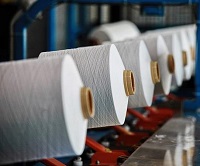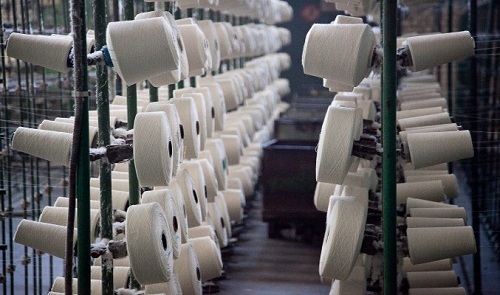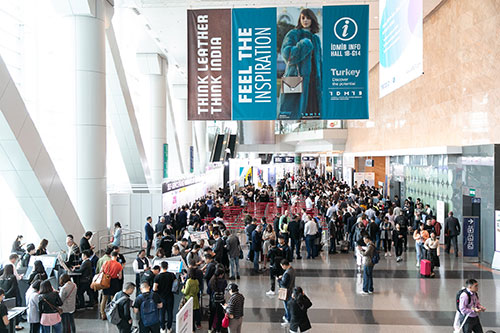FW
Alchemie Technology is set to announce accelerated launch of Novara, a breakthrough new high-throughput digital precision coating technology for technical textiles. Alchemie is actively partnering with manufacturers worldwide to build production lines to address acute personal protective equipment needs and medical textile shortages.
Alchemie’s Novara technology delivers high-precision, 2D-patterned one or two-sided functional coatings to technical textiles, enabling truly unique, multi-functional textiles to be manufactured. Novara combines the throughput of conventional coating technologies with the precision of digital to unlock new product design opportunities and radically reduce the cost of technical textiles. The technology enables functional coatings to be applied with unparalleled precision, all controlled with real-time digital data.
The Novara digital precision coating technology can be delivered as a stand-alone machine or as a module for current production lines, enabling convenient implementation and rapid delivery of manufacturing capacity.
 TEXPROCIL has urged the Government to provide interest free working capital term loans to the exporters to cover the cost of salaries and wages.
TEXPROCIL has urged the Government to provide interest free working capital term loans to the exporters to cover the cost of salaries and wages.
Exporters are facing huge problems as their buyers are delaying payments against export bills for shipments already made. On the other hand, most of the exporters have entered into forward contracts with the banks and now they are unable to surrender the committed amounts on foreign exchange under these contracts due to delay in receiving the payments.
As a result, exporters have to face huge losses as they are forced to either cancel or roll over the forward contracts which involves penalty and other charges. Texprocil suggested that banks should not charge penalty for the cancellation or roll over of forward contracts entered with them by the exporters.
penalty and other charges. Texprocil suggested that banks should not charge penalty for the cancellation or roll over of forward contracts entered with them by the exporters.
For the spinning sector, Texprocil requested to include Cotton Yarn under the MEIS and the RoSCTL scheme since these schemes now stands valid as the validity of the Foreign Trade Policy has been extended till March 31, 2021. It also urged to include fabrics under the ROSCTL scheme.
To address the liquidity problems being faced by the exporters, the council urged the Government to release all pending claims under the TUF scheme and the erstwhile ROSL scheme for Made ups and Garments , automatic enhancement of bank limits for the exporters by 25% and the extension of the Interest Equalization Scheme beyond March 31, 2020 and to cover Cotton Yarn under this scheme
Organisers of the Asia Pacific Leather Fair (APLF) rescheduled the next edition of APLF - Leather, Materials+ and Fashion Access to March 30- April 1, 2021.

The events always take place in March annually but has been rescheduled in light of the initial COVID-19 virus outbreak then largely affecting mainly Asia. The decision to hold the next edition as usual in March 2021 is in direct response to the recent and escalating pandemic now felt globally and in direct response to our industry partners, associations, and most importantly our customers.
“This was a difficult decision for the entire team including our staff, partners, and for the industry to make; however we believe it is the correct course of action that will help sustain the leather and fashion industries in the long run,” said Perrine Ardouin, Event Director of APLF. “The recent unprecedented developments of COVID-19 affecting our community and friends has moved from what was considered just an Asia epidemic at the beginning of this year to what is now a global pandemic. We want to ensure that when APLF returns it is under the best conditions for all participants. In the meanwhile, we will create digital solutions to keep the connection and conversation between buyers and sellers strong, “ he added.
ACLE is the definite leather exhibition in China. It is also the gathering place of the Chinese tanning, footwear, leathergoods, furniture sectors as well as key players in the automotive industry. The exhibition will provide the whole industry with a platform to resume the business and inject confidence through the various conferences and meetings.
To support the industry on maintaining their businesses and staying connected with the community during this difficult period, APLF has various digital products in place, such as the APLF.com marketplace, webinars and InTouch, a new virtual business matching event.
As of now, APLF has planned a series of webinars focusing on educational, industrial and trend topics. The new InTouch initiative is a series of virtual sourcing events during which suppliers will present their products live to buyers around the world. Starting from 16th April, each InTouch event is specially curated to suit different sourcing requirements of the buyers. Exhibitors will present their collections and answer buyers’ questions, and afterwards they will meet each other in a one-on-one business matching meeting.
 Regular promotions schedule may soon come to an end as the impact of the COVID-19 pandemic may result in a decline of off-season merchandise and an overabundance of product. Fashion brands and retailers that typically deliver their collections in April or May, are deferring them to June, July and August. This will further defer their fall sales to September and October, in step with the start of the fall season.
Regular promotions schedule may soon come to an end as the impact of the COVID-19 pandemic may result in a decline of off-season merchandise and an overabundance of product. Fashion brands and retailers that typically deliver their collections in April or May, are deferring them to June, July and August. This will further defer their fall sales to September and October, in step with the start of the fall season.
Downsizing collections to cut losses
To eliminate liability that comes with retailers canceling and returning orders, many fashion companies are downsizing their collections. Major department stores have stopped accepting product since March, purchase orders be damned.
Owner of fashion brands such Equipment, Joie and Current/Elliott, the Collected Group has reduced its planned summer collections by one-third. The size of one of those assortments will be divided among the three scheduled deliveries to retain regular. The company, is also skipping the resort season altogether, which typically enters stores in October, November and December. Though its fall collections, will not change in size, but will drop in six monthly shipments throughout the back half of the year.
size of one of those assortments will be divided among the three scheduled deliveries to retain regular. The company, is also skipping the resort season altogether, which typically enters stores in October, November and December. Though its fall collections, will not change in size, but will drop in six monthly shipments throughout the back half of the year.
Shifting to profit-making products
One of the solutions, Jess Brondo Davidoff, Managing Partner at crisis management firm Sprezzatura is focusing on is shifting its attention to products that drive the biggest bottom line. This also includes identifying the brand’s customers, their buying patterns and the products that bring in most profits. This is determined by factoring in the discounts and performance marketing driving their sales, their rate of returns, and their cost of shipping and warehousing.
Many brands’ are also moving to streamlined assortments, with high sell-through at full price. They are not building additional dollars into their prices, because they know it will be marked down. For instance, Collected Group doesn’t plan to deliver products that are not seasonally appropriate as it just goes to perpetuate the already existing vicious cycle of markdowns, which has been most frequent over the last 12 months.
 COVID-19 pandemic has infected millions of people and taken thousands of lives across the world. Indeed, the outbreak has affected the textile and apparel industry globally as well as in India. A report by Wazir Advisors ‘Impact of COVID-19 on the Indian Textiles Industry’ states, the outbreak and following three week nationwide shutdown has brought textile and apparel industry to a standstill.
COVID-19 pandemic has infected millions of people and taken thousands of lives across the world. Indeed, the outbreak has affected the textile and apparel industry globally as well as in India. A report by Wazir Advisors ‘Impact of COVID-19 on the Indian Textiles Industry’ states, the outbreak and following three week nationwide shutdown has brought textile and apparel industry to a standstill.
India’s textile and apparel industry employs migrant workers from different states and a large workforce comes from nearby rural, semi-rural areas. Due to the current situation, majority of migrant workers have returned to their native places. It would therefore, be a challenge for the government to bring these workers back to factories once the lockdown is lifted. The study then suggests certain initiatives the government could take to kick start the textiles industry.
Government initiatives to move ahead
The pandemic has hit the Indian economy at a time when growth has slowed to the lowest in a decade, investments are shrinking and a consumption recovery is sputtering. To deal with this situation, the government can take several measures with some modifications in existing schemes.
investments are shrinking and a consumption recovery is sputtering. To deal with this situation, the government can take several measures with some modifications in existing schemes.
Some of these relief measures could be:
• Clearing pending subsidies, release of dues under TUFS,
• Export subsidies (RoSCTL/MEIS), and GST refunds, on immediate basis
• Extension of soft loan equivalent to these government dues Deferment of interest charge for a period of six months on all loans
• Moratorium for repayment of principal and interest for one year Reduction in bank interest rate by 3 per cent,
• Atleast 30 per cent additional working capital at lower rates without any collateral, cllateral-free lending for loans up to Rs. 2 crore and max
• Relaxing RBI norms for declaring the defaulting unit as NPA for one year Fiscal support
• Cover all textile, garments and made-ups products under RoSCTL, IES & MEIS benefits
• Increase Interest Equalization Scheme to 5 per cent for all garments and made-ups for FY 2020-21.
• Provide 3 per cent additional ad-hoc export incentive for one year
• Exemption all raw materials, dyes & chemicals, intermediaries, spares, accessories, etc., from basic customs duty and anti-dumping duty
• Defer payment of EPF and ESI contributions for 6 months
• Extend support to the industry for payment of salaries and wages to the workers during the lockdown period.
India’s advantage
The current situation also presents an opportunity for India as it helps brands to reduce dependency on China. It also provides it with an opportunity to explore alternate options such as Bangladesh, India, Vietnam, Cambodia or any other South East Asian suppliers.
Increasing e-commerce focus
Though malls and retailers have closed their brick and mortar stores, their e-commerce channels are still operational in certain countries. These brands and retailers are now driven to incorporate digital strategy in their buying process. Online marketplaces are expected to become more popular as brands and retailers look to maximize digital options of showcasing their products and facilitating the buying and selling process.
Maximising internal capabilities
To fight the economic consequences of this pandemic, manufacturers should maximise their internal capabilities and focus on building their efficiencies. Companies should also adopt digital ways of connecting with buyers. Companies may also focus on planning for the winter or next spring summer season and target the channels of value retailing and ecommerce. Indian companies should also look out for new markets beyond US and EU like Japan, South Korea etc. and focus on diversifying both markets and products.
With depressed prices of raw materials like polyester, cotton etc. textile and apparel companies can also look at hedging raw material prices and wherever possible stock raw material which will be helpful once the market opens again. Companies could also explore emerging product categories such as medical textiles and other textile items required for healthcare facilities like hospital bedsheets, mattresses etc.
Trident’s production in its textiles division declined in March 2020. Its production of bath linen tumbled 37.91 per cent to 2,745 metric ton in March 2020 over 4,421 metric ton in March 2019. The production of bed linen fell 21.3 per cent to 1.81 million metre in March 2020 as against 2.30 million metre in March 2019. Its yarn production fell by 37.41 per cent to 6,327 metric ton in March 2020 compared with 10,108 metric ton in March 2019.
In its paper & chemicals division, the production of paper slumped 29 per cent to 9,615 metric ton in March 2020 as against 13,541 metric ton in March 2019. Production of chemical fell 25 per cent to 6,291 metric ton in March 2020 over 8,367 metric ton in March 2019.
Trident's consolidated net profit fell 27.7 per cent to Rs 79.79 crore on a 12.9 per cent decline in net sales to Rs 1,135.59 crore in Q3 December 2019 over Q3 December 2018.
Amid the corona virus gloom, the multi-crore knitwear industry in Tiruppur has turned into a major centre for manufacturing protective medical gear like face masks, gloves and personal protective equipment (PPE).
The industry, which was suffering due to a slew of factors including tough competition from countries like Bangladesh and Vietnam in apparel export, feels manufacturing of technical apparel could be a viable option to survive in the future.
Swell Knit has bagged an order for making 20 lakh fabric masks which are reusable from Seva Bharti. The firm will supply 3 lakh masks to be sent to Meghalaya and other north-eastern states. These fabric masks are designed as two-layer masks and all of them were approved by a leading textile testing lab
Loyal Textile Mills, which has manufacturing units across the state, produces 4,000 PPE kits and 1 lakh surgical masks a day. The firm has been supplying protective medical gear to hospitals, rotary clubs and several pharmacies across the country. It follows the standards prescribed and we ensure that every rule is complied with.
The BGMEA states, Bangladesh monthly garment exports are likely to decline by 70 percent in April to $972.95 million compared to April 2019. In April last year the earning from the apparel export was $2.53billion. The data projected shows in May it will be the same, with monthly export set to fall by 70 percent to $972 million, compared to $3.24 billion in May 2019.
The cumulative export of garment items in the three months between March and May this year will see a 56.93 percent drop from the corresponding period in 2019 to $3.70 billion compared to the same period last year, when the three months netted $8.60billion.
The loss of export in three months is set to be $4.90 billion -- a 40 percent export loss year on year will also affect the settlement of back to back LCs by $1.96 billion, the BGMEA data also said.
Factories will have to carry unsettled liabilities for the export which have been forecast to be cancelled.
Primark owned by Associated British Foods Plc will cover the wage component of clothing orders that were scheduled for shipment within 30 days after it called off all deliveries. The fund will support workers in Bangladesh, Cambodia, India, Myanmar, Sri Lanka and Vietnam.
Primark has closed all its shops across the UK, Europe and the US following the outbreak of the virus, costing it £650 million ($796 million) of lost revenue a month. After store closures, it asked all suppliers to stop production. The retailer has already paid for £1.6 billion of stock that was in stores, in depots, or in transit before it took the decision to scrap further orders. Its payments to workers will be adjusted to reflect any government support packages provided in each of the countries.
The International Labour Organisation (ILO) and the United Nations Children's Fund (UNICEF) has issued new guidelines for businesses to help them support working families during the COVID-19 pandemic. The preliminary guidance urges employers to consider the impact of business decisions on workers’ families and support greater social protection wherever possible.
The extra support, particularly for those with low incomes, is essential to minimise the negative consequences of the outbreak for workers, employers, their families and children. ILO and UNICEF also called on governments to support employers and strengthen social protection, especially for vulnerable families.
Family-friendly policies and practices, including employment and income protection, flexible working arrangements, paid leave to care for family members and access to quality, emergency childcare can make a critical difference and help stabilize labour markets, families and societies.
The preliminary guidelines for employers include monitoring and following advice from local and national authorities and communicating that to the workforce; reviewing existing workplace policies to ensure those offer sufficient support to workers and their families; following sound practices when implementing policies based on social dialogue, national labour laws and international labour standards; and ensuring workplace support measures are available to all, without discrimination, and that all workers know, understand, and are comfortable with them.












